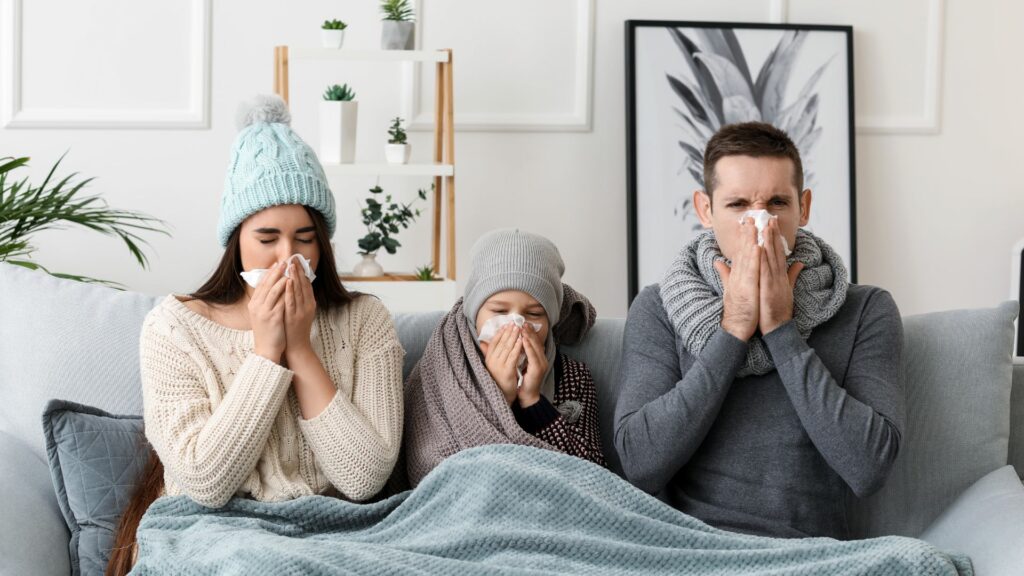Winter is upon us and with it, its share of respiratory infections. Runny or stuffy nose, sore throat, headache, cough… all symptoms that characterise the flu or a cold. But can these infectious diseases really be developed because of the chilly weather? The question arises at a time when the sharp increase in gas and electricity prices is pushing many people not to turn on their heating.
While it can have direct effects on health, including frostbite and hypothermia, cold alone does not cause respiratory infections. Viruses and bacteria are the cause, insisted general practitioner Sylvie Meeus. And yet in the collective imagination, it is because we "catch a cold" that we get sick.
Not so surprising when we dwell on the etymology of the terms used, whatever the language, to qualify these diseases. ‘Cold’ is as much a reference to being sick as it is to the temperature.
Why then are we sick more often during the winter? Even if it is not directly responsible for the infection, the cold "increases all the factors that make an infection trigger," Dr. Thomas Orban, president of the Scientific Society of General Medicine, told VRT.
Confined space, lack of heat and dry air
The specialist explained that, firstly, most people take refuge at home as soon as winter approaches. And to cope with the cold, few will think of sufficiently ventilating their house. "Viral infections are transmitted by the airborne route. So the risk of transmission is much higher when people are confined" in enclosed spaces and the air is not renewed.
The second reason is that the cold temperatures, more present in winter, weaken the immune system since it tires it. "Our body is like a heating plant that must remain at about 36.5 °C permanently in the face of the cold. And it requires a lot of energy, even more now that we heat less," the doctor added. “The immune defences are thus altered. In addition, the reduction in the time of exposure to daylight impacts our immune system.”
Thirdly, "the quality of the mucosa, which is the first barrier to infection, is more altered in winter than in summer,” he said. “The respiratory tract is dried by cold but also by hot air in the rooms where we are." Subjected to severe tests, "the mucous membranes will be less effective in defending themselves so the virus has the ideal conditions to infect the patient."
Covid-19 is a different ball game
It should also be noted that the cold can worsen the health condition of some people for example the immunocompromised, children as they have not yet developed their immunity over time, the elderly – but on a case-by-case basis, and smokers. “Also we should be concerned for people suffering from certain chronic diseases such as heart or respiratory failure, asthma, diabetes, or homeless people,” Sylvie Meeus told RTBF.
"The epidemic peak of respiratory infections usually starts in October-November, so we're all into it.,” she added. “It starts slowly, it goes up until January-February when we really have a peak and then it goes down to March-April. And then we stay in the background during the spring and summer months. In any case, that was before Covid-19, which changed the game since it works in waves."
"Everyone has understood that Covid-19 does not disappear when it is hot, but that it works in epidemic waves,” added Thomas Orban. “The more people are infected, the more the virus will circulate, the more infections will increase." In addition, the reproduction rate differs from one virus to another.
Dress warmly
One of the most important steps one can take to fend off the cold and ‘colds’ is to wrap up well when outside.
"I see a lot of people without good socks, hats, scarves, gloves,” said Thomas Orban. “I think that with the abundance of energy resources, people have forgotten that in winter, you have to dress warmly," Even if the cold itself is not a cause of infections, not covering up accordingly will not help the body fight off potential viruses or bacteria.
Related News
- Belgium's flu season peak not expected until early January
- 'Ready to burn anything': Belgians struggle to stay warm
It is therefore a set of circumstances, bringing together above all exposure to a virus or bacteria, cold and dry climatic conditions and a weakened immune system, which makes it easier for a person to get sick in winter, and therefore by extension when temperatures drop. In any case, prevention is better than cure so make sure you are sufficiently covered up this winter.

